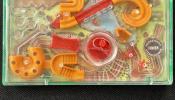OKR Advice From Bruce Lee

Recently, I was introducing my son to the work of Bruce Lee and it dawned on me that he may have been the best OKR coach, ever.
Here are some of my favourite quotes and how I interpret them in the context of OKRs.
“A goal is not always meant to be reached, it often serves simply as something to aim at.”
Let your goals inspire you! Use them to give you energy and direction and a way to judge your success but not yourself!
“Don’t fear failure. — Not failure, but low aim, is the crime. In great attempts it is glorious even to fail.”
Aim high and celebrate progress. Don’t glorify failure. Remember the Google rule of thumb that our targets should be so challenging that we only hit about 80%. As Rick Klau has pointed out, “if you’re consistently scoring 100% on your OKRs, you’re not crushing it, you’re sandbagging.”
“If you don’t want to slip up tomorrow, speak the truth today.”
Transparent and regular OKR check-ins will help you avoid mistakes and create the right conditions for success.
“Be happy, but never satisfied.”
Celebrate the success you’ve achieved but don’t stop moving. OKRs aren’t about completing a single project or climbing one mountain but about learning to learn and becoming more successful at everything you do.
“The less effort, the faster and more powerful you will be.”
Find the highest leverage outcomes and achieve them before doing anything else. Robust conversations about your OKRs will help you find these things.
“Obey the principles without being bound by them.”
Adapt the OKR framework to your context. Make it work hard for you.
“To know oneself is to study oneself in action with another person.”
Keep doing those OKR check-ins and use them to understand how your team thinks, what it believes, and how it works best together.
“I’m not in this world to live up to your expectations and you’re not in this world to live up to mine.”
OKRs must be negotiated, refined, set, and embraced by the team. They cannot be “handed down” or imposed from above. Only the team can adopt them and use them as a means to better understand the team.
“Take things as they are. Punch when you have to punch. Kick when you have to kick.”
The best OKRs will give you a crystal clear view of your operating context and you exactly what you need to do next. They won’t always show you a picture you want to see but if you understand them as a view of reality and take action accordingly, they’ll guide you where you need to be.
“Notice that the stiffest tree is most easily cracked, while the bamboo or willow survives by bending with the wind.”
The only constant is change. Remain flexible. As conditions change, you may need to change and adapt your OKRs mid-cycle. Don’t be afraid to do this and always do it mindfully and transparently involving your stakeholders and those who depend on your outcomes.
“To hell with circumstances; I create opportunities.”
OKRs help you see what is and create what will be. Get into the habit of measuring things. Create a culture of data-driven decision making. Use that data to respond to circumstance and boldly bend reality.
“As you think, so shall you become.”
Clearly define the outcomes you want to achieve. The clearer the picture, the more likely you are to achieve it. An fuzzy picture depicts an impossible outcome. By ensuring you have sharp, measurable key results, you have a better chance of achieving the outcome you really want.
“If you spend too much time thinking about a thing, you’ll never get it done.”
Don’t overthink or over-negotiate your OKRs. Yes, it’s important to have difficult conversations but as Mark Randolph says “You’ll learn more in one hour of doing something than in a lifetime of thinking about it.” Start checking in & delivering ASAP. You can always change later.
“Mistakes are always forgivable, if one has the courage to admit them.”
Be clear, open, and transparent about what’s happening with your OKRs. What’s easier than you expected? Or tougher? Where have you been “lucky”? OKRs are an opportunity to learn continuously, to find new leverage, and use it. This often comes with a lot of uncomfortable realisations but they’re worth it because they allow you to change. If you’re a senior leader, create an environment where new mistakes are welcomed.
“Be like water making its way through cracks. Do not be assertive, but adjust to the object, and you shall find a way around or through it. If nothing within you stays rigid, outward things will disclose themselves."
When you define a bold, ambitious, clear goal, it has its own gravity. It will naturally pull you towards it via the quickest most efficient path. When setting OKRs, it’s useful to have some notion about how you’ll reach them but don’t obsess over the exact path. Allow yourself and your team to be responsive but not reactive.
“Absorb what is useful. Discard what is not. Add what is uniquely your own.”
This quote came from my wonderful colleague at GDS, Muhammed Rehman
It’s a great reminder to take any advice (including this advice) with a grain of salt and a healthy dose of skepticism and gumption. Listen, learn, attempt, and adapt. It also reminds me of the wonderful principle of Shu Ha Ri.
Summary
- Let your goals inspire you, even if you never reach them
- Celebrate progress but don’t rest on your laurels
- Rise to the next challenge
- Persist
- Stay flexible
- Be honest, open, and transparent
- Think but don’t overthink
- Create your own opportunity, understand but don’t be a victim of circumstance
- Maximise efficacy, not effort
- Adapt



